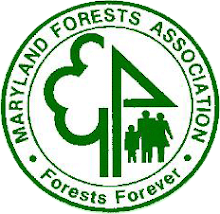Managing our trees and forests create jobs and helps makes our state sustainable. This initiative is designed to increase the forest economic impact in Maryland. “We have a green and renewable resource if it is nurtured and cared for scientifically”, stated John Jastrzembski, President of the MFA and Professor of Forestry at Allegany College of Maryland. “Sustainable forests are healthy, vibrant, improve quality of life, and create jobs. All Marylanders benefit from healthy, well managed forests. This is evident with the recently enacted 2009 Maryland Sustainable Forestry Act, the most comprehensive state forestry legislation in the nation”, exclaimed Jastrzembski.
William R. Miles, speaking on behalf of the Association of Forest Industries, stated “The nationally-acclaimed Sustainable Forestry Act of 2009 sets forth statutory strategies intended to promote the retention of privately-owned forest land because of their measurable environmental and economic contributions to the Chesapeake Bay restoration effort and rural resource-based communities. In short, this historic Act – a model for national emulation -- makes clear that forestry is the preferred land use within the State of Maryland and that every reasonable policy-related effort should be advanced to promote forest land retention.”
“The New Page Luke mill is Maryland’s largest forest products company and has a long history of conservation of natural resources, having been established in Allegany County in 1888,” stated Pat Moore, Luke Mill Manager. “Our operation currently employs approximately 950 individuals, produces 1,500 tons per .org day of coated paper, and uses approximately 4,000 tons of wood per day as a raw material. Responsible forest management is critical to ensuring an adequate supply of wood fiber for our papermaking operation, and we applaud Maryland for the great work that they are doing in this area.”
Glatfelter is another large employer in the state and primarily situated on Maryland’s Eastern Shore. Tom Wieland, Regional Forest Manager of Glatfelter noted that the recession may be technically over but signs that our forest products suppliers and family forest landowners are struggling.
“Our Forests are strategically important.”, commented State Forester Steve Koehn, who spearheads forestry issues for the Maryland Department of Natural Resources and is the past president of the National Association of State Foresters. “Our state forests, family owned forests, and industrial partners provide a myriad of benefits for Marylanders. Our forests are important for improving air and water quality, storing carbon, improving quality of life, enhancing wildlife habitat and providing sustainable jobs”
“We want people to understand that forest management includes using forests in a sustainable fashion”, said Chris Holmgren, a forest products operator located in Montgomery County. “I love working in the woods and utilizing trees that in many cases are destined for a landfill. I create furniture and other products from these waste materials. It drives me crazy that people think I am destroying forest. I am a conservationist. I represent a portion of Maryland’s green industry. I am a small business owner. I am proud to promote sustainable forest management in Maryland.
Maintaining Maryland's forests is crucial in protecting wildlife habitat and imperative in improving the quality of our streams, rivers and the Chesapeake Bay. “Supporting a vibrant and sustainable forest based economy is an important way to ensure that our forests remain forests by affording landowners a sustainable revenue opportunity as an alternative to development. Growing green forest based jobs can be good for both Maryland's natural resources and it's local economies,” exclaimed Craig Highfield, coordinator of the Alliance for the Chesapeake Bay's Forestry for the Bay program.
“The Maryland Association of Forest Conservancy District Boards, with “Forestry Boards” in every county encourages local jurisdictions to manage their forested resources wisely. We are losing approximately 7000 acres of forest annually in Maryland. This simply is not sustainable and we are working at the county level to help conserve Maryland’s forests and educate the public about how individuals can help and the many benefits of preserving trees,” added Jim Bardsley, Association President, biologist, and Anne Arundel County resident.
"Our forests are critical to Maryland’s future and the restoration of the Chesapeake Bay, not just ecologically but economically too”, said Gary G. Allen, Chairman of the new Sustainable Forestry Council created by the 2009 Act and appointed by the Governor O’Malley to define and lead the effort to sustain Maryland’s forest lands into the 21st Century. “Sustainable management of our forest resources will produce sustainable jobs,” Allen emphasized.
In Maryland, the forest products industry and associated green industries including arborculture, urban design, and nursery management produce 37,000 jobs. Managed forest can create more jobs. “Nurturing our forests and trees nurtures jobs”, said Steve Castrogiovanni, President of the Maryland Arborist Association, “a green Maryland benefits everyone.”
“Maryland’s forest industry contributes $7 billion in economic output with 37,000 jobs. There are 130,000 family owned forests in Maryland,” states Karin Miller, Executive Director of the Maryland Forests Association. “MFA works to insure that vibrant forests are maintained throughout the State, providing diverse economic and environmental benefits to all Marylanders.”
For further information visit MFA's Website at http://mdforests.org or contact MFA at 301-895-5369 or via email at director@mdforests.org.




No comments:
Post a Comment